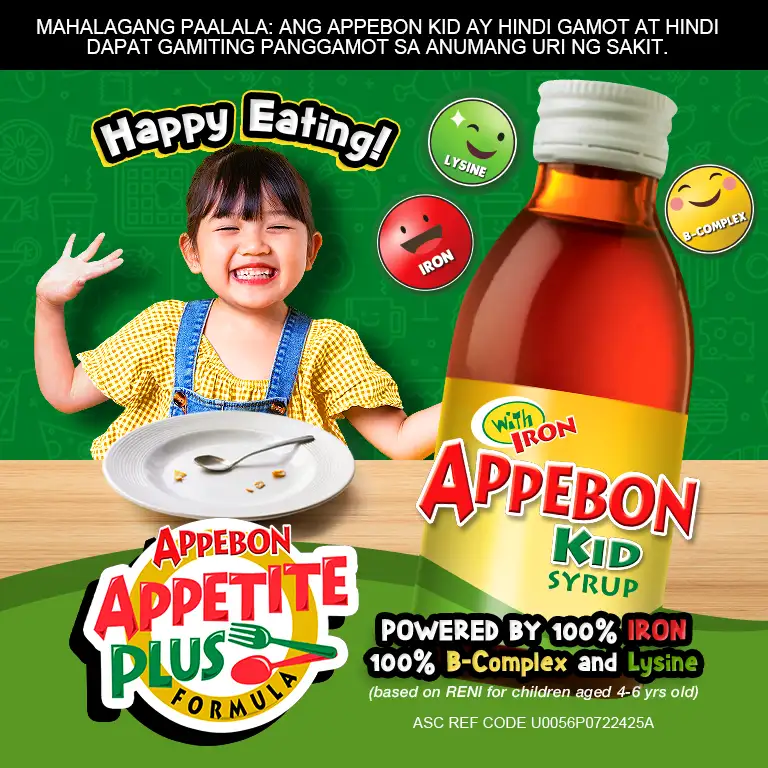For parents, it’s definitely satisfying to see your kid’s plate or bowl empty after mealtimes, especially when you know that you’ve prepared something delicious and healthy. This can be encouraging, since it shows that your kid is receptive to the meals given to him or her and is willing to eat what’s in it.
As you may know, an increased appetite is one of the many good signs that a kid is healthy. When kids eat more food, they may be able to receive vitamins, minerals, and other nutrients that’ll help them achieve a healthy weight and promote overall growth and development.
However, not all parents may experience this triumph. There are some kids who are picky with their food, don’t have a strong desire to eat, or a combination of both. Because of these, some kids are unable to receive the nutrients they need to both maintain a healthy weight and grow healthy and strong.
If your kid is dealing with appetite loss or is a picky eater, don’t worry! This is where certain vitamins and nutrients can come in and play roles as appetite boosters for kids. Check out this quick read to learn about the nutrients to look out for.
These Nutrients Can Be Game-Changers for Kids’ Healthy Weight
With so many essential nutrients for kids out there, it can be overwhelming to make a choice. However, if raising kids’ appetite and ensuring they reach a healthy weight are your main goals, these three nutrients may help you out:
- Vitamin B Complex: These refer to a group of eight B vitamins that play various roles in improving your kids’ health. In a nutshell, these nutrients assist with tissue building by functioning as much-needed coenzymes that help transform energy. Moreover, these B vitamins also assist in increasing a kid’s appetite and energy levels. In particular, make sure kids get vitamin B1, B6, and B12.
How much do kids need daily: Depends on gender and age (based on 2015 Philippine Dietary Reference Intakes released by the Department of Health [DOH])- Vitamin B1
Age Boys Girls 1 to 2 years old 0.4 mg 3 to 5 years old 0.5 mg 0.4 mg 6 to 9 years old 0.6 mg 0.5 mg 10 to 12 years old 0.7 mg 0.8 mg - Vitamin B6
Age Boys Girls 1 to 2 years old 0.4 mg 0.5 mg 3 to 5 years old 0.5 mg 6 to 9 years old 0.6 mg 0.7 mg 10 to 12 years old 0.7 mg 1.0 mg - Vitamin B12
Age Boys Girls 1 to 2 years old 0.8 mcg 0.9 mcg 3 to 5 years old 0.9 mcg 1.0 mcg 6 to 9 years old 1.1 mcg 1.2 mcg 10 to 12 years old 1.5 mcg 1.7 mcg
- Vitamin B1
- Iron: The mineral is crucial in many body functions as it may help promote growth and facilitate production of healthy red blood cells.
Healthy red blood cells play an important role in your kid’s health as these assist in delivering oxygen throughout the body. These cells may also help strengthen your kid’s immunity and increase protection against sickness and infection.
How much do kids need daily: Depends on gender and age (based on 2015 Philippine Dietary Reference Intakes released by the Department of Health [DOH])Age Boys Girls 1 to 2 years old 6.4 mg 7.0 mg 3 to 5 years old 7.5 mg 7.4 mg 6 to 9 years old 8.6 mg 7.8 mg 10 to 12 years old 10.2 mg 16.5 mg - Lysine: This is an essential amino acid that may help the body when it comes to absorbing calcium, iron, and zinc; creating hormones and energy; and producing collagen that’s important for bones and tissues.
How much do kids need daily: According to researchers, the estimated average requirement (EAR) for kids is at 35 mg · kg−1 · d−1. You can ask your doctor for more details.
Here’s Where Your Kids Can Receive the Nutrients They Need for Their Appetite
When it comes to your kid’s nutritional needs, make sure you’re not settling for anything less. With the help of these nutrients and together with proper diet and exercise, your kids can expand their palate and be more enticed to try other kinds of food. Vitamin B complex, iron, and lysine can be found in food such as:
- Vitamin B complex: Peas and whole grains (vitamin B1); pork, poultry, peanuts, oats, and bananas (vitamin B6); meat, fish, milk, eggs, cheese, and some fortified breakfast cereals (vitamin B12)
- Iron: Red meat, pork, poultry, seafood, beans, peas, leafy green vegetables like spinach, and iron-fortified cereal, bread, and pasta
- Lysine: Red meat, pork, poultry, fish like cod and sardines, eggs, and soybeans
Vitamin B complex, iron, and lysine can also be found in various supplements specially formulated for kids. You can definitely ask your kid’s pediatrician for some guidance on choosing the right supplement for your growing one.
ASC Reference No. U0070P033023A, U0132P081825A
References:
Lysine Information
How to tell if your child is sick
Healthy eating for children
Iron (for Parents)
Health Benefits of Vitamin B Complex
6 Vitamins and Minerals Your Kids Need
Why Is Vitamin B Complex Important and Where Do You Get It?
10 Iron-Rich Foods Your Toddler Needs
Vitamins (for Kids)
Iron deficiency in children: Prevention tips for parents
Iron deficiency anemia
B vitamins and folic acid
Amino Acids
Iron needs of babies and children
What are the health benefits of lysine?
B Vitamins
Iron supplementation improves appetite and growth in anemic Kenyan primary school children
Iron status and linear growth: a prospective study in school-age children
Iron Metabolism and Immune Regulation
Philippine Dietary Reference Intake



